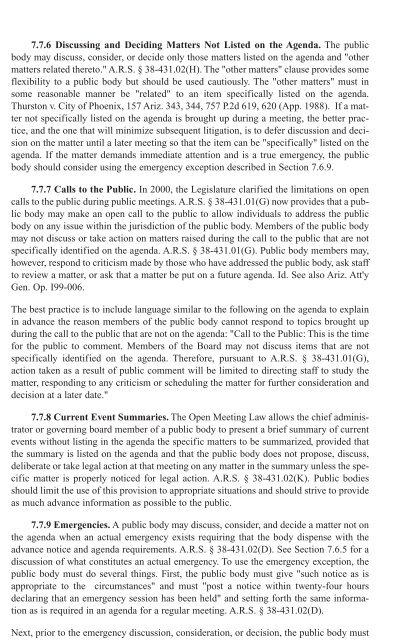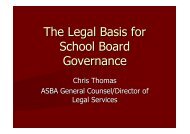The Arizona Open Meeting Law - Arizona School Boards Association
The Arizona Open Meeting Law - Arizona School Boards Association
The Arizona Open Meeting Law - Arizona School Boards Association
Create successful ePaper yourself
Turn your PDF publications into a flip-book with our unique Google optimized e-Paper software.
7.7.6 Discussing and Deciding Matters Not Listed on the Agenda. <strong>The</strong> public<br />
body may discuss, consider, or decide only those matters listed on the agenda and "other<br />
matters related thereto." A.R.S. § 38-431.02(H). <strong>The</strong> "other matters" clause provides some<br />
flexibility to a public body but should be used cautiously. <strong>The</strong> "other matters" must in<br />
some reasonable manner be "related" to an item specifically listed on the agenda.<br />
Thurston v. City of Phoenix, 157 Ariz. 343, 344, 757 P.2d 619, 620 (App. 1988). If a matter<br />
not specifically listed on the agenda is brought up during a meeting, the better practice,<br />
and the one that will minimize subsequent litigation, is to defer discussion and decision<br />
on the matter until a later meeting so that the item can be "specifically" listed on the<br />
agenda. If the matter demands immediate attention and is a true emergency, the public<br />
body should consider using the emergency exception described in Section 7.6.9.<br />
7.7.7 Calls to the Public. In 2000, the Legislature clarified the limitations on open<br />
calls to the public during public meetings. A.R.S. § 38-431.01(G) now provides that a public<br />
body may make an open call to the public to allow individuals to address the public<br />
body on any issue within the jurisdiction of the public body. Members of the public body<br />
may not discuss or take action on matters raised during the call to the public that are not<br />
specifically identified on the agenda. A.R.S. § 38-431.01(G). Public body members may,<br />
however, respond to criticism made by those who have addressed the public body, ask staff<br />
to review a matter, or ask that a matter be put on a future agenda. Id. See also Ariz. Att'y<br />
Gen. Op. I99-006.<br />
<strong>The</strong> best practice is to include language similar to the following on the agenda to explain<br />
in advance the reason members of the public body cannot respond to topics brought up<br />
during the call to the public that are not on the agenda: "Call to the Public: This is the time<br />
for the public to comment. Members of the Board may not discuss items that are not<br />
specifically identified on the agenda. <strong>The</strong>refore, pursuant to A.R.S. § 38-431.01(G),<br />
action taken as a result of public comment will be limited to directing staff to study the<br />
matter, responding to any criticism or scheduling the matter for further consideration and<br />
decision at a later date."<br />
7.7.8 Current Event Summaries. <strong>The</strong> <strong>Open</strong> <strong>Meeting</strong> <strong>Law</strong> allows the chief administrator<br />
or governing board member of a public body to present a brief summary of current<br />
events without listing in the agenda the specific matters to be summarized, provided that<br />
the summary is listed on the agenda and that the public body does not propose, discuss,<br />
deliberate or take legal action at that meeting on any matter in the summary unless the specific<br />
matter is properly noticed for legal action. A.R.S. § 38-431.02(K). Public bodies<br />
should limit the use of this provision to appropriate situations and should strive to provide<br />
as much advance information as possible to the public.<br />
7.7.9 Emergencies. A public body may discuss, consider, and decide a matter not on<br />
the agenda when an actual emergency exists requiring that the body dispense with the<br />
advance notice and agenda requirements. A.R.S. § 38-431.02(D). See Section 7.6.5 for a<br />
discussion of what constitutes an actual emergency. To use the emergency exception, the<br />
public body must do several things. First, the public body must give "such notice as is<br />
appropriate to the circumstances" and must "post a notice within twenty-four hours<br />
declaring that an emergency session has been held" and setting forth the same information<br />
as is required in an agenda for a regular meeting. A.R.S. § 38-431.02(D).<br />
Next, prior to the emergency discussion, consideration, or decision, the public body must<br />
- 29 -



